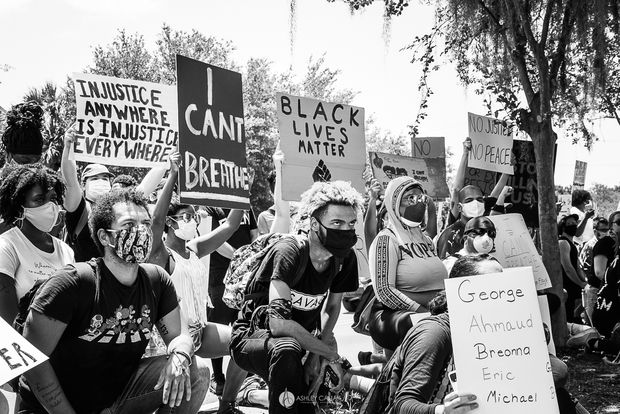To so many people across the world watching Derek Chauvin’s trial over the last several weeks, myself included, the evidence was clear and damning before it even began. The swiftness of the jury’s decision to convict him of the murder of George Floyd confirmed that.
And yet, my heart pounded in my chest as the judge approached the podium, and the feeling that came when he read the verdict—before relief—was shock. Of everything we have experienced in the past year, a person being held accountable for murder should not be shocking. That our justice system didn’t completely fail should not be shocking. We’ve spent too long trying to exist within the systems that were created to control and diminish Black and brown bodies to not be shocked at this rare and exceptional outcome.
Yesterday mattered. George Floyd’s life mattered. The overwhelming feelings of relief and release that his family expressed yesterday matter. A family who will never see their son, their father, their bother, their uncle, their friend again.
But yesterday was only a pinpoint of light in a system that is broken beyond repair.
The fact is, holding one person accountable does not change a broken system. When we make this case only about individuals—only about Derek Chauvin—we are focusing on one tree in a forest that is on fire all around us. Individual cases, while important, will not in themselves change the greater truth that policing in this country was founded on and continues to be driven by white supremacy and anti-Black racism. No matter which way the verdict went, the system of policing is still killing people.
Yesterday, this broken system led to the tragic murder of Ma’Khia Bryant, a 16 year-old girl, by police in Columbus, Ohio. This broken system meant that what was truly shocking yesterday was the conviction of a murderer—not the murder of a child by police.
As the Movement for Black Lives tweeted yesterday: A conviction is not justice.
Justice means wholly changed systems. Justice means an end to white supremacy. Justice means defunding the police and reinvesting in community-led solutions. Justice means safety and access to resources for BIPOC communities in every aspect of life.
Continuing to build, support, and resource intersectional movements led by Black people is how we will get there. The uprisings of the past year that tens of millions participated in have been among the largest in our country, and it is these efforts and the incredible organizing that has gone alongside them that were critical to getting us to this moment. It is these efforts that will get us closer to justice.
Today, we remember George Floyd. We remember Ma’Khia Bryant. We remember Daunte Wright. We remember Breonna Taylor. We remember all of our beloved community and family members who have left this earth too soon because of racist violence. We denounce the racist systems that led to their murders, and to the murders of too many.
We remember, today and every day, that this fight is all of ours to fight because justice has to be intersectional—and that people’s lives and our collective liberation is at stake.
Katie Carter is Pride Foundation’s CEO.
